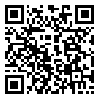Volume 25, Issue 6 (9-2018)
RJMS 2018, 25(6): 31-42 |
Back to browse issues page
Download citation:
BibTeX | RIS | EndNote | Medlars | ProCite | Reference Manager | RefWorks
Send citation to:



BibTeX | RIS | EndNote | Medlars | ProCite | Reference Manager | RefWorks
Send citation to:
Ghoreishi M S, Abusalehi A, Peyman N, Tehrani H. The effect of preventive educational intervention for promoting iron supplement use in high school female’s students: an application of health belief model. RJMS 2018; 25 (6) :31-42
URL: http://rjms.iums.ac.ir/article-1-4971-en.html
URL: http://rjms.iums.ac.ir/article-1-4971-en.html
Mashhad University of Medical Sciences, Mashhad, Iran , peymann@mums.ac.ir
Abstract: (4097 Views)
Background: Iron supplementation is a necessary component of programs to control iron deficiency anemia because in many populations, the amount of iron absorbed from the diet is not sufficient to meet many individuals’ requirements and it can lead to increased prevalence of iron deficiency among adolescents that are one of high risk groups. This study aimed to determine the effect of preventive educational intervention for promoting iron supplement use in high school female’s students.
Methods: In this quasi-experimental study, 140 high school girl students from Mashhad participated during 2016-2017 (test group n=70 and control group n=70). The research tools included one questionnaire of demographic information, knowledge and the HBM constructs regarding iron consumption. After collecting pre-test data, the educational intervention was implemented for adolescent girls in the test group & the post-tests were carried out immediately and three months after the intervention ended. The data were analyzed using appropriate statistical tests through SPSS software v.19.
Results: Before the study, both groups had not any significant difference in all variables and constructs (p>0.05). After intervention a significant difference was reported between the test and control group concerning knowledge (p=0.01), perceived barrier (p=0.002), perceived benefit (p=0.03), self-efficacy (p=0.01) and iron consumption (p=0.005).
Conclusion: Health education programs which are based on health belief model can be effective in promoting health awareness, and cognitive perceptions and behavior high school girl students.
Methods: In this quasi-experimental study, 140 high school girl students from Mashhad participated during 2016-2017 (test group n=70 and control group n=70). The research tools included one questionnaire of demographic information, knowledge and the HBM constructs regarding iron consumption. After collecting pre-test data, the educational intervention was implemented for adolescent girls in the test group & the post-tests were carried out immediately and three months after the intervention ended. The data were analyzed using appropriate statistical tests through SPSS software v.19.
Results: Before the study, both groups had not any significant difference in all variables and constructs (p>0.05). After intervention a significant difference was reported between the test and control group concerning knowledge (p=0.01), perceived barrier (p=0.002), perceived benefit (p=0.03), self-efficacy (p=0.01) and iron consumption (p=0.005).
Conclusion: Health education programs which are based on health belief model can be effective in promoting health awareness, and cognitive perceptions and behavior high school girl students.
Type of Study: Research |
Subject:
Educational Health
Send email to the article author
| Rights and permissions | |
 |
This work is licensed under a Creative Commons Attribution-NonCommercial 4.0 International License. |







